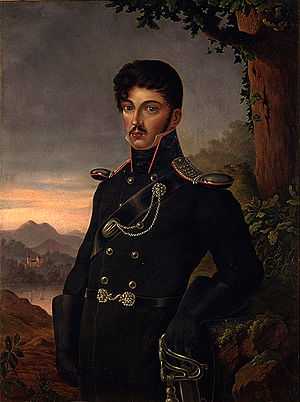Schwertlied

"Schwertlied" ("Sword Song")[1] is a poem by Theodor Körner, written shortly before his death in battle on 26 August 1813.[2][3]
Historic context
Theodor Körner was a famous poet during his lifetime, and was appointed poet to the court at the Vienna Burgtheater. He nonetheless gave up his civilian life and joined the Lützow Free Corps, a Prussian military unit composed of volunteers from all over Germany.
As a soldier, Körner wrote several patriotic poems, like "Lützows wilde, verwegene Jagd" and the "Schwertlied". Several hours after having written the "Schwertlied" Körner fell in battle near Gadebusch (Mecklenburg),[4] and consequently became a national hero in Germany.
Content

"Schwertlied" functions as paean of warrior spirit. Therein, Körner describes the relationship between a soldier and his sword as if the weapon were his bride thirsting for blood. In the end, he draws the sword, as battle awaits him, thus making the marriage legal before God ("At last / Hath truly God allied / The right hand to the bride.").
| German | English[1] |
|---|---|
1. Du Schwert an meiner Linken, |
1. Thou sword at my left side, |
2. "Mich trägt ein wack'rer Reiter, |
2. "I grace a warrior's side, |
3. Ja, gutes Schwert, frei bin ich |
3. Good sword, yes, I am free, |
4. "Dir hab' ich's ja ergeben, |
4. "To thee did I not plight |
5. Zur Brautnachts-Morgenröte |
5. The clanging trumps betray |
6. "O seliges Umfangen! |
6. "O blissful hour! I sigh |
7. Was klirrst du in der Scheide, |
7. Why in thy sheath dost clash, |
8. "Wohl klirr' ich in der Scheide, |
8. "Yes in my sheath I clash; |
9. Bleib' doch im engen Stübchen! |
9. Stay in thy narrow cell, |
10. "Lass mich nicht lange warten! |
10. "O do not long delay! |
11. So komm denn aus der Scheide, |
11. Then quit thy sheath that I |
12. "Ach, herrlich ist's im Freien, |
12. "O lovely blue expanse! |
13. Wohlauf, ihr kecken Streiter, |
13. Up, warriors! awake, |
14. Erst tat es an der Linken |
14. At first she did but cast |
15. Drum drückt den liebeheißen |
15. Then press with fervent zeal |
16. Nun lasst das Liebchen singen, |
16. Now let her sing and clash, |
Settings
The poem was set to music by Carl Maria von Weber in 1814 (op. 42 Nr. 6, J. 169).[5]
Franz Schubert set the poem as a part-song (or: cantata) for voice, unison choir and piano, on 12 March 1815 (D 170). It was first published in 1873, and in the 1894 edition of Series XX, Volume 2 of Franz Schubert's Works it was published as No. 54.[4]
See also
References
- ↑ 1.0 1.1 Alfred Baskerville. The Poetry of Germany. Fifth Edition, Philadelphia, 1866, pp. 221–224
- ↑ "Körner, Karl Theodor" in Collier's New Encyclopedia, 1921.
- ↑ Description by James Leonard. "Schwertlied ("Du Schwert an meiner Linken"), song for chorus & piano, D. 170 - Franz Schubert | Details, Parts / Movements and Recordings". AllMusic. Retrieved 2014-06-15.
- ↑ 4.0 4.1 Otto Erich Deutsch. Schubert Thematic Catalogue. No. 170
- ↑ Emily Ezust (editor). "Schwertlied". The LiederNet Archive (retrieved 8/3/2015)